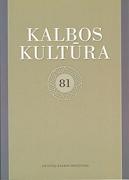Ką seka sekantis?
What follows the following
Author(s): Pranas KniūkštaSubject(s): Language and Literature Studies
Published by: Lietuvių Kalbos Institutas
Keywords: Participle; sekantis
Summary/Abstract: The participle sekantis (Eng. ‘following’) has aroused and still arouses a large amount of discussion. There are quite a few issues to be solved in its relation to the verb sẽka (sèkti). The verb sekti is ambivalent: it means going after someone or something and depends on the one who/which goes before him/her/it. It thus is possible to follow sb or sth (sekti) in space or time, e.g.: Šuo seka paskui žmogų (Eng. lit. ‘The dog follows after a man’); Nelaimės sekė viena kitą (viena po kitos) (Eng. lit. ‘Misfortune follows oneNomSg anotherAccSg/one after another’). Going one after another with no relation of dependency or causality is expressed by the verb eiti (Eng. ‘to go’) or another verb in the same meaning, e.g.: dienos eina (slenka) po dienų (Eng. lit. ‘Days go/drag after days’), autobusas eina (važiuoja) po autobuso (Eng. ‘Abus goes after a bus’ <one after another>). The participle sekantis is not fully compatible with the normative use of the base verb sekti. The participle can also refer to sb or sth going after another, but the causative relation can be excluded, like in the following: sekanti diena (Eng. ‘the next day’), sekantis autobusas (Eng. ‘the next bus’). There are also cases with no reference to previous events, rather, the focus is on further developments, e.g.: Darbų tvarka sekanti (Eng. ‘The work sequence is the following’). Such use is clearly deviant and is unanimously corrected. However, the first two examples (sekanti diena and sekantis autobusas) are debatable: some linguists replace the participle by the pronoun kitas (autobusas) (Eng. ‘another bus’), others tend to justify the given usage without any implied causality, because the pronoun kitas could equally refer to the immediate as well as any further item in a sequence. Traditional actual use has never accepted the participle sekantis in such utterances; it cannot be used in the language of formal register. However, it should not be treated as a gross and indisputable mistake either.
Journal: Bendrinė kalba (iki 2014 metų – Kalbos kultūra)
- Issue Year: 2008
- Issue No: 81
- Page Range: 236-244
- Page Count: 9
- Language: Lithuanian

